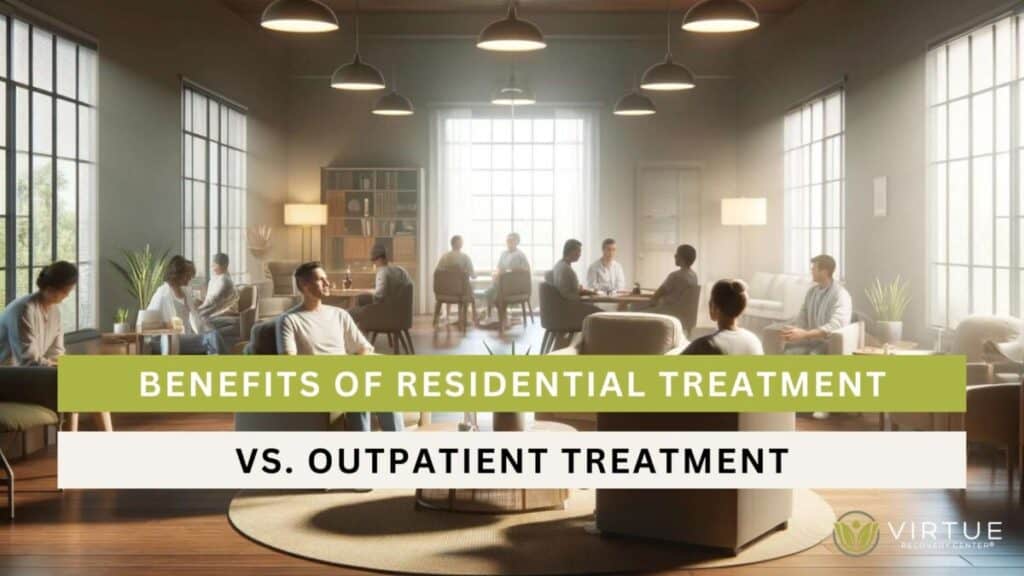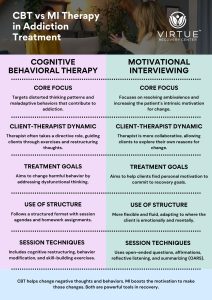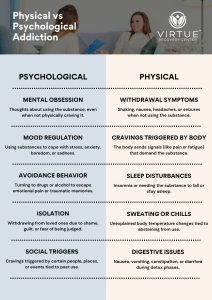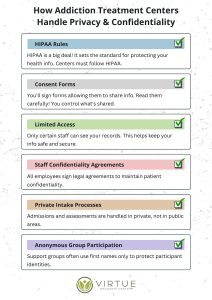Key Takeaways
- The in-depth comparison of the residential and outpatient treatment programs.
- Understanding how each treatment type meets the needs and lifestyles of different people.
- The advice on selecting the most suitable treatment plan for the person who wants to recover.
Introduction
The choice of the right treatment place is the key to the process of overcoming addiction. This choice can significantly affect the treatment’s efficiency and long-term recovery outcome. At Virtue Recovery Las Vegas, we know that it is essential to find the treatment program that is the best for each person. If you are considering residential treatment with its all-inclusive environment or the outpatient program with flexibility, this article will guide you through each option. Thus, you will be able to make an informed decision.
Understanding Treatment Settings
Residential or inpatient treatment programs are where the patient lives at the treatment facility and gets a structured and supportive environment with 24/7 care. This environment is perfect for those who need treatment and help. On the contrary, outpatient treatment programs enable people to stay at home and go to the facility for therapy and treatment sessions for a certain number of hours per week. This choice is for those who have to go on with their daily life, like work, school, or family care.
Residential Treatment Programs
The residential treatment at Virtue Recovery Las Vegas is a complete program for addiction recovery from substance use. Patients are the ones who gain from the constant medical care and emotional support, and they are removed from the triggers and stresses of their regular environment. This environment is perfect for those who have a severe addiction problem, a history of relapse, or a dual diagnosis of mental health conditions. The residential care is so immersive that it allows the patient to concentrate on their recovery without interruption, and the different therapeutic modalities help in deep healing. Residential mental health problems can also be addressed alongside addiction treatment with a dual diagnosis. Dual diagnosis can also include addressing eating disorders the individual may have. Patients get 24-hour care at the facilities, which provide a level of treatment that outpatient doesn’t provide.
What is a Residential Treatment Center?
A Residential Treatment Center (RTC) is a live-in healthcare facility that provides therapy and support for individuals dealing with various issues, such as substance abuse, mental health disorders, or behavioral problems. At an RTC, residents receive round-the-clock care and supervision in a structured environment designed to help them recover and heal. The treatment typically includes individual and group therapy sessions, medical monitoring, and tailored treatment plans that address recovery’s psychological and physical aspects. The goal of a residential treatment center is to provide a safe, supportive environment where individuals can focus entirely on their recovery, away from the stressors or triggers of their everyday life. This intensive care setting is often crucial for those who need a stable environment to overcome complex or long-standing health challenges. Residential treatment centers provide individualized treatment plans created by health professionals curating the type of onsite treatment the client will receive. This can address building life skills, addressing behavior problems, social skills, psychotherapy, and skills training throughout the treatment process.
What Are the Benefits of Substance Use Residential Treatment Services?
Substance use residential treatment services offer several critical benefits that are essential for effective recovery from addiction. Firstly, these services provide a safe and structured environment that minimizes exposure to triggers and potential relapse risks, allowing individuals to focus solely on their recovery without the distractions of everyday life. Secondly, residential treatment offers comprehensive care that includes medical detox, individual and group therapy, and support for co-occurring disorders, ensuring that all aspects of a person’s health are addressed. Moreover, being in a community of peers who share similar struggles provides emotional support and enhances motivation through shared experiences and goals. Additionally, residential programs typically offer customized treatment plans tailored to each individual’s unique needs, increasing the likelihood of successful long-term recovery from substance use disorders. This immersive approach not only helps individuals break the cycle of addiction but also equips them with the tools and strategies needed to maintain sobriety after they leave the facility.
Outpatient Treatment Programs
The outpatient treatment at Virtue Recovery Las Vegas is a less intensive but not less effective way of addiction recovery. This choice is for those who have a mild to moderate addiction and have a sound support system. Outpatient care is so flexible that people can continue their daily activities while receiving the whole treatment, which includes therapy, counseling, and group sessions. This mixture of treatment and personal responsibility can motivate people to be more independent and be ready for long-term sobriety.
Tailoring Treatment to Individual Needs
The individual situation mainly determines the proper treatment. Residential treatment is suitable for those who need intensive support and a controlled environment, while outpatient treatment is for those who have less severe addiction or have many daily obligations. At Virtue Recovery Las Vegas, the professionals conduct the assessments very detailedly to recommend the best treatment modality based on the severity of addiction, personal health, lifestyle factors, and support systems, thus ensuring that each person gets personalized care.
Cost Considerations
The price of the treatment is a significant factor. Residential programs, being more comprehensive, are usually more costly than outpatient programs. Virtue Recovery Las Vegas takes many insurance plans and gives financial aid to those who cannot afford the treatment, so the money problem does not stop anyone from getting the help they need.
Lifestyle and Social Factors
Lifestyle and social commitments are the main factors determining whether one should seek residential or outpatient treatment. Outpatient treatment might be the best choice for people with many work, school, or family responsibilities. On the other hand, those who can afford to take a break from daily responsibilities might benefit more from fully immersive residential care.
Long-term Recovery and Support
Virtue Recovery Las Vegas’ residential and outpatient programs offer follow-up support and relapse prevention planning. Long-term recovery is achieved through continuous counseling, support groups, and access to community resources, which are critical factors for maintaining sobriety after treatment.
Making the Decision
The choice of residential or outpatient treatment depends on personal needs, recovery goals, and lifestyle. Talking to healthcare providers about these options is very important; they can give you information and advice based on a thorough assessment of each person’s case.
Conclusion
You must choose your path to recovery according to your needs and goals. Whether you go to residential or outpatient treatment, Virtue Recovery Las Vegas will help you recover.
In case you or someone you know is having a problem with addiction, you can call Virtue Recovery Las Vegas at 866-520-2861 to find out the treatment options and begin your recovery today.
FAQs
What are the main differences between residential and outpatient treatment programs?
Residential treatment is where you live at the facility with 24/7 care, while outpatient treatment is for those who live at home and attend treatment sessions regularly.
How do I know which treatment type is right for me or my loved one?
Think about the level of the addiction, the family duties, and the social networks, and then consult a healthcare provider.
Can I switch between treatment types if my needs change?
Of course, the transition from one program to another is possible as the recovery needs change.
What type of aftercare and follow-up do residential and outpatient programs offer?
Both programs have the same aftercare planning, continuous therapy, and support groups.
How can family involvement differ in residential vs. outpatient treatment?
Residential treatment may have structured family programs, while outpatient treatment allows for more regular interaction with family, which can be involved in the therapy sessions.
What does residential mean in therapy?
In therapy, “residential” refers to a treatment setting where individuals live full-time at the facility while receiving comprehensive care and support. This immersive environment provides continuous access to medical professionals and therapists, facilitating intensive treatment and recovery.
What is the meaning of a residential treatment facility?
A residential treatment facility is a specialized live-in center where individuals receive intensive therapeutic care for various issues, such as mental health disorders, substance abuse, or behavioral problems. These facilities provide a structured environment with around-the-clock support and treatment programs designed to help residents make significant and lasting changes in their lives.
What are the goals of inpatient mental health treatment?
The goals of inpatient mental health treatment are multifaceted and aimed at providing immediate stabilization, comprehensive assessment, and intensive therapy. Key objectives include:
- Stabilizing the Patient: This is often the primary goal, especially in severe mental health crises, to ensure patient safety and address immediate risks.
- Diagnosis and Assessment: Accurately diagnose the patient to understand the underlying issues and develop an effective treatment plan tailored to their needs.
- Intensive Therapy: Offering a range of therapeutic interventions, such as individual counseling, group therapy, and possibly medication management, to address the root causes of the patient’s mental health issues.
- Developing Coping Strategies: Equipping patients with the tools and skills to manage symptoms, handle stress, and improve emotional regulation.
- Planning for Aftercare: Preparing a continued care plan to support the patient’s transition out of inpatient care and help maintain long-term recovery and mental health stability.
Overall, inpatient mental health treatment aims to provide a controlled, supportive environment where patients can begin their journey to recovery under constant medical and psychological supervision.
Is inpatient the same as residential?
The goals of inpatient mental health treatment focus on stabilizing patients in crisis, providing a comprehensive assessment and diagnosis, and delivering intensive therapy. This approach aims to equip individuals with effective coping strategies and prepare them for a sustainable recovery through ongoing support and aftercare planning.
What is another name for a residential treatment facility?
Another name for a residential treatment facility is an inpatient treatment center.
What is a residential treatment for eating disorders?
Residential treatment for eating disorders is an intensive, structured program where individuals live at a facility to receive comprehensive care and support for conditions like anorexia, bulimia, and binge eating disorder. This type of treatment provides a safe environment that combines medical monitoring, nutritional guidance, therapy, and psychiatric support to address both the physical and psychological aspects of eating disorders, aiming to promote recovery and establish healthy eating habits and behaviors.
What is the difference between residential treatment and partial hospitalization programs?
Residential treatment and partial hospitalization programs (PHPs) are both intensive treatment options for mental health, substance abuse, and other disorders, but they differ in structure and intensity.
- Residential Treatment: In residential treatment, individuals live at the treatment facility full-time, receiving 24-hour care and support. This setting allows for continuous monitoring and intensive therapy, making it suitable for those with severe conditions or those who need a safe and structured environment away from daily stressors.
- Partial Hospitalization Programs (PHPs): PHPs provide similar intensive treatment but do not require patients to live at the facility. Instead, patients attend the program for multiple hours during the day, typically five to seven days a week, and return home or to a sober living environment at night. This option is often used as a step down from residential treatment or for individuals who require significant therapeutic intervention but have a stable home environment.
The main difference lies in the residential aspect; residential treatment removes individuals from their home environment entirely, while PHP allows them to maintain some connection with their daily lives outside of treatment hours.
Resources
https://nida.nih.gov/publications/drugs-brains-behavior-science-addiction/treatment-recovery













